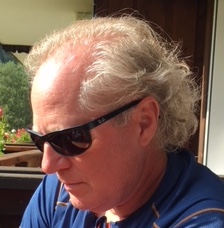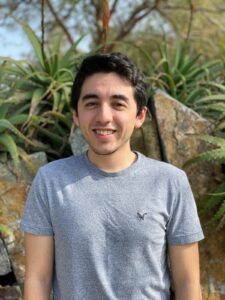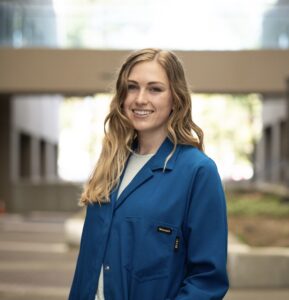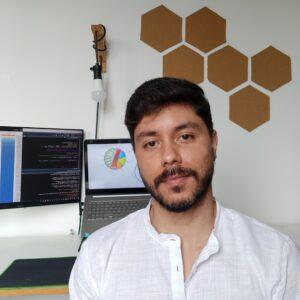Bart C. Weimer, Ph.D. is the Chair and Professor of Microbiology in the Department of Population Health and Reproduction within the School of Veterinary Medicine at the University of California, Davis. His research is focused on the intersection of food, health, and the microbiome using bacterial population genomics. Included in his research direction is the use of systems biology, population genomics, and machine learning to examine the role of bacteria to be bioactive. He leads the 100K Pathogen Genome Sequencing Project, which enables reference genomics for surveillance, population evolution, and metagenomic studies. He is active in various international organizations for microbiology and science including the American Society for Microbiology and the American Association for the Advancement of Science. His lab is fortunate to receive extensive funding from many sources including the US federal government, the food industry, and the analytical genomics industry, that seek to impact the global attention to bacterial spread and persistence. Dr. Weimer has a leadership role in microbial genomics and bacterial physiology that brings about collaborations at the interface of adjacent fields with the aim of bringing new ideas into microbiology so as to leverage new approaches to study critical questions within bacterial growth, evolution, and persistence in humans, animals, plants, and the environment broadly. Dr. Weimer is the founding editor-in-chief for Bacteria, a section editor for Virulence, an editor for Microorganisms, and on the editorial board of four additional scientific journals. He has trained over 45 Ph.D. students, published over 190 peer-reviewed papers that are broadly cited and has been awarded multiple patents related to bacteria and their ability to change our environment. He has published 7 books, 30 book chapters, and 223 manuscripts and has 8 patents.
Graduate Students & Staff
My research focuses on understanding the genetic and metabolic underpinnings of novel forms of biological nitrogen fixation. I aim to promote sustainable agricultural practices by studying unique nitrogen-fixing bacteria associated with mucilage-secreting maize and potentially extending the benefits of symbiotic nitrogen fixation to other crops. Before joining the Weimer Lab, I completed a BS in Biological Sciences with a concentration in microbiology at California State University, Stanislaus. While at CSU Stanislaus, I conducted research on bacteria isolated from compost and studied the temporal differences of their degradative enzyme profiles. As a second-year Microbiology Ph.D. student, I plan on using genomics, metabolomics, and bioinformatics to elucidate uncharacterized mechanisms of nitrogen fixation. In my free time, I enjoy watching sci-fi movies, hanging out with my wife and cats, and playing soccer.
As a microbiology Ph.D. student in the Weimer Lab, I aim to expand my career in infectious disease research by leveraging bioinformatics to engage population-scale complexity. My research interests lie in using population genomics to explore diversity and make sense of differences within microbial populations. My current projects consist of genomic variation in Helicobacter pylori associated with cancer in humans, Corynebacterium pseudotuberculosis genomic diversity and antimicrobial resistance from animals, and diversity with virulence and antimicrobial resistance dynamics in bovine respiratory Pasteurellaceae pathogen populations. I additionally contribute to Weimer group collaborations, consisting of wide-ranging projects from viruses to microbiomes, working with groups across Davis and around the world. Prior to joining the Weimer Lab, I worked at multiple institutions in infectious disease research: as a research assistant at Harvard University, I assayed genetic diversity in malaria populations in relation to disease control; as a post-bacc. research scholar at the University of Rochester, I investigated atypical molecular pathogenesis of Vibrio cholerae; as an undergraduate at the University of Texas at Austin, I performed disease ecology fieldwork for Leishmania in Texas, while I earned B.S. degrees in biochemistry and microbiology. Building on my past research experience and incorporating the techniques and approaches of the Weimer Lab, I work to provide comprehension to emerging challenges in infectious diseases and public health interests in my current work and future career.
Host-microbe interactions are complex but incredibly important to holistic health. My research focuses on investigating these complex interfaces using a variety of omics tools to understand every angle of such interkingdom interactions. Most specifically, I am interested in understanding the metabolic and gene expression changes that underscore the mechanics of microbial activity at a host interface. I earned my BS in Microbiology from UC Davis and continued on to pursue a PhD in Animal Biology with Dr. Matthias Hess. Throughout my undergraduate years and shortly after I worked in the human health space, both in academic and industry labs, utilizing pigs as a model for the infant gut microbiome and probiotic development. In the Weimer Lab I work on a variety of projects all addressing the central topic; what happens when microbes meet their host? I am currently working on projects involving the effect of feed additives on pathogenic activity in Salmonella in a host and the effect of foodborne pathogen association on stem cell differentiation. Outside of the Weimer Lab I enjoy working at the University Writing Program as a Writing Fellow, helping fellow graduate students and Postdocs formulate writing strategies and overcome writing challenges.
Currently, my main project is related to metagenomics focused on microbiome analysis, exploring the intricate interactions between microbial communities in plants. In addition, I am actively involved in multiple research projects, such as Salmonella population analysis, Corynebacterium pseudotuberculosis comparative genomics, and fecal transplant analysis in healthy dogs. In this context, I am particularly interested in integrating multi-omics data, such as genomics, transcriptomics, proteomics, and metabolomics, to obtain a comprehensive understanding of bacterial systems. I also want to explore the application of machine learning to identify key factors in bacterial pathogenesis, antibiotic resistance, and survival mechanisms. Overall, my research interests are at the intersection of bioinformatics, machine learning, and microbiology. As a bioinformatician, I have mainly worked in whole-genome sequencing (WGS) of animal pathogens and probiotics. I obtained my Doctorate and Master’s degrees in Bioinformatics from the Universidade Federal de Minas Gerais (UFMG) in Brazil. I also hold a Bachelor’s degree in Biotechnology from the Universidade Federal da Bahia, Brazil.
______________________________________________________________
Former Students
Narine Arabyan, Ph.D., Microbiology
Poyin Chen, Ph.D., Microbiology
Ning Chin, M.S., Forensic Sciences
Ashleigh Flores, M.S.
Shawn Higdon, Ph.D., Plant Sciences
Allison Weis, Ph.D., Microbiology
DJ Darwin Bandoy, DVM, Ph.D., Microbiology





